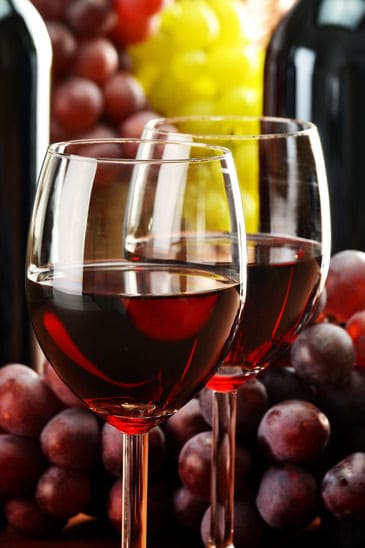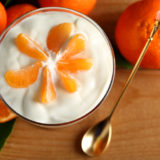

A naturally occurring antioxidant that appears to have several health benefits, resveratrol has received a great deal of publicity. Despite being promoted on popular TV shows like “Dr. Oz” and lining shelves at your local health food store, resveratrol remains a mysterious and poorly understood compound.
Resveratrol Basics
Resveratrol is a member of a group of plant compounds called polyphenols that exhibit antioxidant properties. Resveratrol is found in highest concentrations in the skin of red grapes, but it is also in:
- Red wine
- Purple grape juice
- Peanuts
- Blueberries
- Japanese knotweed
- Cranberries
- Pomegranate
Resveratrol has been implicated as being responsible for the beneficial effects of red wine consumption, which has been called the “French Paradox.” Despite eating large amounts of saturated fat in the form of butter, cheese, cream and eggs, French people have a remarkably low rate of coronary heart disease – and they consume a fair amount of red wine.
A growing body of research shows that resveratrol acts as an antioxidant and anti-inflammatory substance, providing anti-carcinogenic, cardiovascular, metabolic and anti-aging health benefits. Although many laboratory and animal-based studies suggest that resveratrol should be one of our health and wellness staples, research on the health effects of resveratrol in humans is limited.
Conflicting Studies
Some companies and healthcare providers condone taking resveratrol supplements, but the scientific evidence supporting this practice is a bit shaky. This is because study results are all over the map. Below are several examples of this conflict:
- Liver Cancer – As published in the December 2010 edition of the Journal of Medicinal Food, Taiwanese researchers found reservatrol to be an important chemoprevention agent for liver cancer associated with Hepatitis C infection.
- Cardiovascular – As published in a July 2013 edition of The Journal of Physiology, Danish researchers found that exercise improved several parameters of cardiovascular health in men over age 65, but supplementing with resveratrol blunted most of these effects. This study contradicts previous findings in animal studies.
- Hepatitis C – As published in a January 2010 edition of the World Journal of Gastroenterology, Japanese researchers found that resveratrol was not a suitable antioxidant for Hepatitis C because it enhanced viral replication.
- Hypertension – As published in an August 2013 edition of Hypertension, Australian researchers found that resveratrol could reduce the risk of high blood pressure and high cholesterol because it reduced endothelial dysfunction and evoked vasorelaxation.
- Inflammation – As published in an August 2012 edition of the American Journal of Cardiology, Spanish researchers found that resveratrol reduced inflammation of the heart by 26 percent.
The studies described above relied on human participants; however, a majority of the trials claiming resveratrol has dramatic health benefits were conducted on animals.
Taking Resveratrol Supplements
Consuming resveratrol in its natural form (grapes, berries and peanuts) is a relatively safe endeavor, but experts believe it is difficult to consume a therapeutic dosage this way. Dr. Oz advises people to take one 500 mg capsule of resveratrol daily with food to help maintain a strong, healthy heart. Though, resveratrol supplements may not necessarily deliver amazing health protection benefits:
- When taken orally, resveratrol appears to be easily absorbed by humans; however, its bioavailability is relatively low because it is eliminated and metabolized quickly.
- Resveratrol supplements might interact with blood thinners such as warfarin (Coumadin) and non-steroidal anti-inflammatory drugs, like aspirin and ibuprofen, increasing the risk for bleeding.
- The dosages in most resveratrol supplements are typically far lower than the amounts that have been shown beneficial in research studies. Most supplements contain 250 to 500 milligrams of resveratrol. To get the equivalent dose used in some animal studies, people would have to consume 2 grams of resveratrol (2,000 milligrams) or more a day.
- Safe limits of supplemental resveratrol have not been determined.
After all of the analysis is said and done, it is clear that resveratrol is a potent antioxidant worthy of our attention. In fact, several pharmaceutical companies have worked to capitalize on resveratrol’s potential. Despite this, there simply is not enough evidence gathered in human trials to confidently declare resveratrol effective for a certain health concern, determine how to best administer it or assign a dosage at which it would be most valuable. Even though popping a few resveratrol supplements might seem like a realistic heart health shortcut, experts support the notion of eating a nutritious diet full of brightly colored fruit and vegetables (including grapes, berries and pomegranates), and exercising regularly.
References:
http://altmedicine.about.com/od/herbsupplementguide/a/resveratrol.htm, Resveratrol, Cathy Wong, Retrieved September 22, 2013, about.com, 2013.
http://lpi.oregonstate.edu/infocenter/phytochemicals/resveratrol/, Resveratrol, Retrieved September 20, 2013, Linus Pauling Institute, 2013.
http://www.ajconline.org/article/S0002-9149(12)01046-6/abstract, One-Year Consumption of a Grape Nutraceutical Containing Resveratrol Improves the Inflammatory and Fibrinolytic Status of Patients in Primary Prevention of Cardiovascular Disease, J. Tome-Carneiro, et al, Retrieved September 22, 2013, The American Journal of Cardiology, August 2012.
http://www.doctoroz.com/videos/4-supplements-longer-life, 4 Supplements for a Longer Life, Retrieved September 22, 2013, Harpo, Inc., 2013.
http://www.livescience.com/39125-foods-good-sources-resveratrol.html, 4 Foods that Are Good Sources of Resveratrol, Deborah Enos, Retrieved September 20, 2013, Tech Media Network, 2013.
http://www.mayoclinic.com/health/red-wine/HB00089, Red Wine and Resveratrol: Good for your heart?, Retrieved September 22, 2013, Mayo Foundation for Medical Education and Research, 2013.
http://www.ncbi.nlm.nih.gov/pubmed/20066737, An antioxidant resveratrol significantly enhanced replication of hepatitis C virus, Nakamura M, et al, Retrieved September 22, 2013, World Journal of Gastroenterology, January 2010.
http://www.ncbi.nlm.nih.gov/pubmed/20946021, Resveratrol arrests cell cycle and induces apoptosis in human hepatocellular carcinoma Huh-7 cells, Liao Pc, et al, Retrieved September 22, 2013, Journal of Medicinal Food, December 2010.
http://www.ncbi.nlm.nih.gov/pubmed/23753407, Resveratrol improves vascular function in patients with hypertension and dyslipidemia by modulating NO metabolism, Carrizzo A, et al, Retrieved September 22, 2013, Hypertension, August 2013.
http://www.ncbi.nlm.nih.gov/pubmed/23878368, Resveratrol Blunts the Positive Effects of Exercise Training on Cardiovascular Health in Aged Men, Gliemann L, et al, Retrieved September 22, 2013, Journal of Physiology, August 2013.
http://www.nih.gov/researchmatters/march2013/03252013resveratrol.htm, How Resveratrol May Fight Aging, Harrison Wein, PhD, Retrieved September 20, 2013, National Institutes of Health, 2013.
http://www.rsc.org/chemistryworld/2013/06/resveratrol-red-wine-heart-disease-podcast, Resveratrol, Phillip Broadwith, Retrieved September 22, 2013, Royal Society of Chemistry, 2013.
http://www.sciencedaily.com/releases/2013/07/130722071955.htm, Too Many Antioxidants? Resveratrol Blocks Many Cardiovascular Benefits of Exercise, Retrieved September 20, 2013, ScienceDaily LLC, 2013.
http://www.webmd.com/heart-disease/resveratrol-supplements, Resveratrol Supplements, Retrieved September 20, 2013, WebMD, LLC, 2013.





I definitely consume my fair share of cranberry juice and peanut butter every day, but I think I’ll add blueberries and pomegranate to my grocery list! ACTUALLY, I DID recently try a natural fruit bar made from blueberry and pomegranate. It was delicious! I should stock up! 🙂